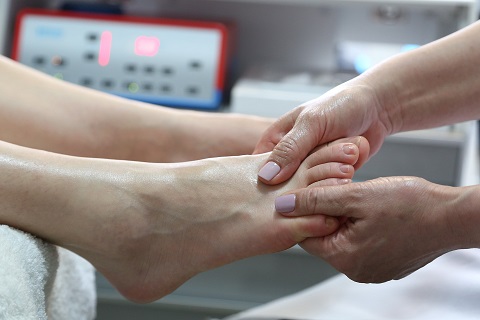First Podiatry Appointment: What to Expect
Giving your feet the same level of attention and care as you do the rest of your body is essential. After all, they’re crucial to your quality of life, especially if you’re an athlete. Just as you visit a cardiologist for your heart health, seeing a podiatrist for your foot care needs is also important. After deciding to prioritize your health and scheduling your initial podiatry appointment, we want to clarify what you should expect during your visit.
What Does a Podiatrist Do?
Since you’re considering making your appointment, you probably already know that a podiatrist is a foot doctor. But what exactly do healthcare providers such as Dr. Schoene and Dr. Bever do? These specialized practitioners primarily focus on the health of your ankles, feet, and toes. Dr. Bever is an experienced foot and ankle surgeon. Dr. Schoene has practiced sports medicine for nearly four decades and brings her expertise as an athletic trainer to her podiatry practice. This combination is a rarity for most doctors in the field.

Podiatrists can help relieve orthopedic-type pain, treat wounds, evaluate gait issues, treat dermatology issues, evaluate vascular issues, and perform surgery for many types of issues. They also play a vital role in treating chronic conditions that can adversely affect your feet, including diabetes. According to the Diabetes Research Institute, more than 37 million people in the U.S. have this disease, and as many as 34% of those patients are likely to experience foot problems during their lifetime. That’s why many people need to have a general understanding of podiatry appointments, starting with the necessary paperwork.
Step One: Document Your Medical History
When you arrive for your appointment, our front office staff will ask you to fill out a medical history report. You’ll provide information about your foot-related habits, such as running. The form will also include questions about the following:
- Current foot problems.
- Medical conditions, such as diabetes.
- Prescriptions and herbal medications.
- Previous surgeries, if any.
- Family medical history.
Step Two: The Physical Examination
After your complete your medical history, it’s time for a physical exam. Your practitioner will look closely at your feet, toes, and ankles, checking for signs of common issues, such as:
- Dermatologic issues: fungus, nail issues, skin lesions
- Vascular issues; any circulation issues, or venous/vein disease
- Neurological issues: evaluate sensation, look for nerve injuries
- Mechanical/orthopedic issues: eval gait, range of motion, test strength and flexibility
- Evaluate X-rays and other lab or radiology tests.
Step Three: Evaluate Your Shoes
Whether you’re an athlete or not, we recommend taking advantage of an expert shoe evaluation. While it’s essential for your doctor to thoroughly examine your feet, assessing how well your footwear works for you is also necessary. With all the hype around sneaker technology, we’re all bombarded with marketing messages telling us what type of shoes to buy. It’s important to note that not all footwear that promotes superior performance and impressive designs provides you with optimal foot support.
That’s why we suggest bringing all the shoes you wear for work, walking, and sports training to your appointment for the doctor’s inspection. While this practice may seem extreme, if you’re struggling with foot problems, it can help our team develop a successful treatment plan.
Step Four: Diagnostics and Screenings
Once your examinations and evaluations are complete, Dr. Schoene or Dr. Bever may want to perform additional diagnostics. Further tests could be warranted because pain and other symptoms can be misleading. These imaging scans and screenings aim to detect structural issues and narrowing or blockages of your foot’s blood vessels.
Blood work is another test that we may order to screen for conditions such as rheumatoid arthritis or any others that can cause foot pain. For example, if you have an infection on your foot, your practitioner will likely collect a blood sample and have it tested in the lab.
Step Five: Develop a Comprehensive Treatment Plan
Numerous conditions affect your feet, and thankfully there are treatment plans to help you live pain-free. If you’re overweight, our doctors may suggest changes to your diet and exercise routine to help improve your foot condition. Losing weight can relieve excess pressure that may worsen your symptoms.
If you suffer from abnormal gait and foot alignment when walking or running, your doctor may also prescribe orthopedic insoles called orthotics to help support your feet while controlling their movements. Depending on your diagnosis, you may also receive a prescription medication to help combat the issue. We commonly prescribe topical antifungals, antibiotics, or other medications depending on your specific issues or condition.
If you’re experiencing symptoms such as foot pain, bunions, or ankle swelling, or you’ve experienced an injury, it’s time to make your first podiatry appointment. Don’t wait to visit the office; start preparing now, especially if you have diabetes or a chronic foot issue. You don’t have to do much beforehand. Just collect all your shoes, your ID, and insurance information, and arrive 15 minutes early. Our friendly, professional staff will be here, ready to help you achieve optimal foot health.
Visit our Podiatry Practice in Chicago, IL Today
Our practitioners at Gurnee Podiatry & Sports Medicine Associates genuinely take the time to address your concerns, answer your questions, and thoroughly evaluate you for any foot problems. Contact us today to make your first appointment for a thorough examination by Dr. Schoene and Dr. Bever.
